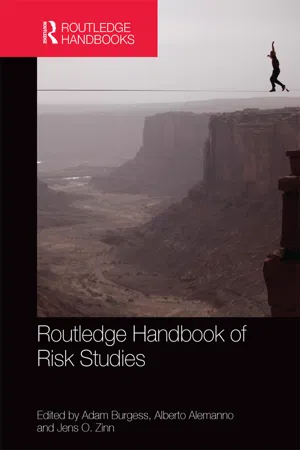
Routledge Handbook of Risk Studies
- 362 pages
- English
- ePUB (mobile friendly)
- Available on iOS & Android
Routledge Handbook of Risk Studies
About this book
It is over 40 years since we began to reflect upon risk in a more social than technological and economic fashion, firstly making sense of the gap between expert and public assessment of risks, such as to our health and environment. With fixed certainties of the past eroded and the technological leaps of 'big data', ours is truly an age of risk, uncertainty and probability - from Google's algorithms to the daily management of personal lifestyle risks. Academic reflection and research has kept pace with these dizzying developments but remains an intellectually fragmented field, shaped by professional imperatives and disciplinary boundaries, from risk analysis to regulation and social research. This is the first attempt to draw together and define risk studies, through a definitive collection written by the leading scholars in the field. It will be an indispensable resource for the many scholars, students and professionals engaging with risk but lacking a resource to draw it all together.
Frequently asked questions
- Essential is ideal for learners and professionals who enjoy exploring a wide range of subjects. Access the Essential Library with 800,000+ trusted titles and best-sellers across business, personal growth, and the humanities. Includes unlimited reading time and Standard Read Aloud voice.
- Complete: Perfect for advanced learners and researchers needing full, unrestricted access. Unlock 1.4M+ books across hundreds of subjects, including academic and specialized titles. The Complete Plan also includes advanced features like Premium Read Aloud and Research Assistant.
Please note we cannot support devices running on iOS 13 and Android 7 or earlier. Learn more about using the app.
Information
Introduction
The risk – and probability – society
Table of contents
- Cover Page
- Half Title Page
- Title Page
- Copyright Page
- Contents
- List of figures
- List of tables
- Notes on contributors
- Introduction—Adam Burgess
- PART I Basic concepts and development
- PART II Social approaches to risk
- PART III Hazard assessment and decision making
- PART IV Risk management
- PART V Regulation and governance
- PART VI Key research dimensions
- PART VII International aspects
- PART VIII Emerging areas
- Index